Why Does My Dog Eat Grass? Reasons & Remedies!
As pet owners, we often find ourselves puzzled by our furry companions’ peculiar habits, like eating grass. While this behaviour may seem strange, it’s common and has various underlying causes. In this blog section, we’ll explore why your dog might indulge in this grassy snack, focusing on understanding whether it could be due to a dietary deficiency.
Around 79% of dog owners have seen their pets eat grass. If you’re asking why my dog eats grass, many others are. Your dog might eat grass for fun because it’s bored or needs more fibre. This odd behaviour can make your dog vomit, indicating it doesn’t feel well.
It’s generally okay for your dog to nibble on grass from your yard. However, it can be harmful if the grass has been treated with pesticides or contains parasites. Contacting a veterinarian is recommended to ensure your dog’s safety and well-being.
Key Takeaways
- Grass eating can come from several reasons, such as liking the taste, boredom, or needing more in their diet.
- If a dog vomits after eating grass, it might be trying to soothe their stomach, or they could be sensitive to it.
- Grass from safe, untreated areas offers fewer risks of pesticides or parasites.
- Seeing a vet is a good idea if your dog won’t stop eating grass or it worries you.
- Improving your dog’s diet by addressing nutrient gaps can reduce their eating of grass.
Understanding Dog Grass Eating Behavior
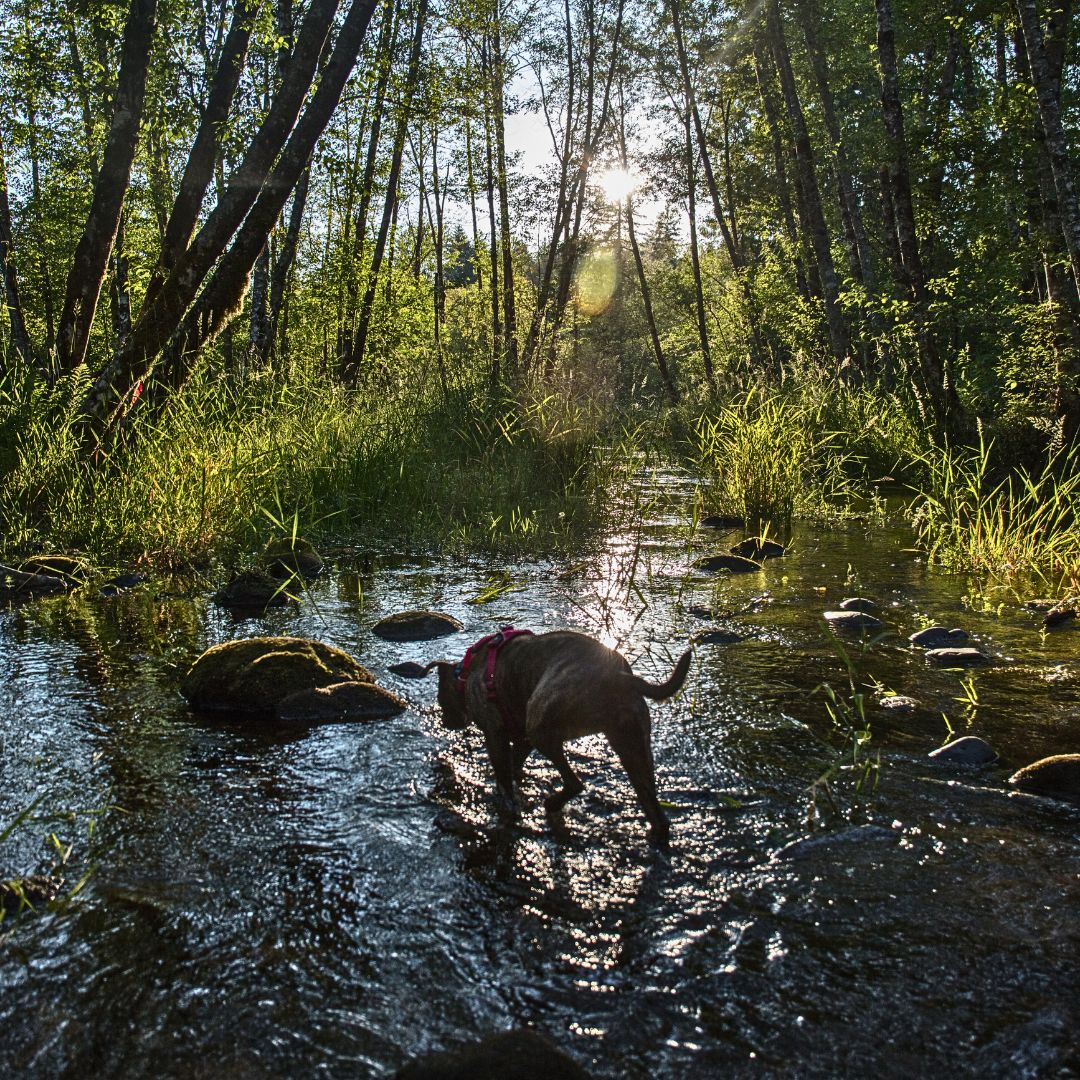
Dogs are naturally curious creatures, and exploring the world around them leads to intriguing behaviours. One such behaviour is the consumption of grass, a common yet not fully understood phenomenon. It is essential to explore the various reasons behind this behaviour to understand better why our canine companions engage in this activity.
Curiosity and Exploration
Dogs chew on grass mainly because of their inherent curiosity. Like us, they like to check out the world around them. The grass feels and smells different, sparking their interest. This leads them to chew on it, exploring new tastes and textures.
Taste Preferences
Some dogs eat grass because they like how it tastes. They are attracted to specific flavours, just like us with our favourite foods. It’s mostly harmless, but you should monitor their grass intake. To ensure your dog eats well, ensure their diet is nutritious enough.
Reasons for Dog Eating Grass
Understanding why dogs eat grass can help you stop this habit. Often, the reason is linked to their diet and what they’re missing. This knowledge can guide you to a solution.
Diet Deficiency
When dogs eat grass, it might mean they lack enough nutrients. This usually happens with low-quality dog food. Their bodies look for the missing nutrients in the grass. A good, balanced diet can reduce this behaviour. It’s wise to talk to your vet, who can suggest what to feed them.
Need for Fiber
Fiber is another reason dogs eat grass. It helps in digestion. Dogs without enough fibre turn to grass to help them poop or have regular bowel movements. Adding fruits and vegetables to their diet is a good idea. This will lower their need to eat grass.
| Aspect | Low-Fiber Dog Food | High-Fiber Dog Food |
|---|---|---|
| Nutrient Levels | Often lacking | Well-balanced |
| Digestive Health | May cause issues | Promotes healthy digestion |
| Common Ingredients | Fillers, grains | Fibrous vegetables, fruits |
| Overall Benefits | Potential deficiencies | Meets dogs’ dietary needs |
Is It Normal for Our Dogs to Eat Grass?
Many dog owners ask, is dog grass-eating normal? Yes, this is seen as a regular part of normal canine behaviours. A lot of dogs show interest in grass. It’s an activity they have done for a long time.
Sometimes, eating grass makes dogs vomit. But this only sometimes means they are sick or lack something in their diet. If your dog occasionally eats grass, it’s usually safe and nothing to worry about regarding dog health and grass consumption.
Yet, if your dog eats a lot of grass or seems unwell, this could signal a health problem. In such cases, talking to a vet is vital to ensure your dog is okay. By watching your dog, you can learn more about their needs and keep them healthy.
“Is it a cause for concern if my dog frequently consumes grass? What are the potential implications of this behavior?”
Dogs eating grass is often seen as normal behaviour. But there are things to watch out for to keep your dog safe. Knowing the potential risks of this habit is key.
Pesticides and Herbicides
Dog grass eating poses risks, like taking in harmful chemicals. In many areas, poisonous pesticides and herbicides are used. These might cause your dog to vomit, have diarrhea, or feel tired. Thus, checking where your dog plays and keeping it chemical-free is crucial.
Parasites
Eating grass might also introduce your dog to harmful parasites. These can bring about infections that lead to serious health problems. Avoiding grass in common pet areas and visiting a vet regularly are smart choices.
Staying alert and proactive can greatly lower the risks of dog grass eating. If you’re worried about this behaviour, consult your vet to ensure your furry friend stays well.
When to See a Vet About Your Dog’s Grass Eating
You should see a vet if your dog eats grass and then shows odd symptoms. Knowing when to get professional help is key to keeping your pet healthy. Trust your instincts when you think something’s wrong.
Signs of Illness
Grass eating might be normal but could also hint at serious health issues. Watch for signs of canine illness, such as diarrhea, tiredness, or a lack of appetite.
Combined with eating grass, these signs could mean your dog is sick. They could have tummy problems or other health issues. It’s not just about the boredom they sometimes feel.
Consistent Vomiting
Sometimes, dogs throw up a bit, and it’s not a big deal. But if they keep throwing up after eating grass, it could be serious. It might mean they’re eating something bad for them, or they might have a problem with their stomach.
In this case, it’s important to see a vet. They can help figure out what’s wrong and provide dog vomiting solutions, which could prevent more health issues from happening.
A common question is when to consult a vet. If your dog keeps showing symptoms, it’s time to call the vet. A professional can give you a clear answer on what your dog needs to get better.
Ways to Prevent Your Dog from Consuming Grass.
Dogs eat grass for various reasons, such as digestive issues, boredom, or nutritional deficiencies. While occasional grass consumption is not harmful, excessive grass eating can lead to vomiting, diarrhea, and other gastrointestinal problems. Here are some tips to help prevent your dog from consuming grass:
1. Provide a Balanced Diet: Ensure your dog gets a complete and balanced diet that meets their nutritional needs. These can help reduce the urge to eat grass.
2. Increase Exercise and Enrichment: It’s important to address boredom and stress by preventing dogs from eating grass and providing plenty of mental stimulation through regular exercise. Include playtime and interactive toys that can help keep your dog engaged and content.
3. Identify and Address Underlying Issues: If your dog eats grass due to a medical condition, such as nausea or stomach discomfort, consult your veterinarian to address the underlying problem.
4. Use Deterrents: Commercial products can be sprayed on the grass to make it less appealing to dogs. You can also cover areas of grass with mulch or gravel.
5. Supervise Outdoor Time: Watch your dog closely in the yard and interrupt it if it starts to eat grass.
Implementing these tips can help discourage your dog from consuming grass and maintain Health and well-being.
Training and Positive Reinforcement
If your dog has a habit of munching on grass, it’s important to address this behaviour through positive reinforcement training. This approach is more effective and helps build a strong bond between you and your dog.
The first step is to understand why dogs eat grass. In many cases, it’s a natural behaviour to eat grass, not necessarily a sign of an underlying health issue. However, excessive grass-eating can sometimes indicate digestive problems or nutritional deficiencies.
Using positive reinforcement can redirect your dog’s attention to more appropriate behaviours. When your furry friend resists the urge to snack on grass, reward them with tasty treats, praise, or fun playtime. It’s a great way to encourage good behaviour and strengthen your bond with your pet.”Over time, this will help your dog learn that there are better ways to satisfy their instincts.”
To minimize the likelihood of your dog consuming grass, it’s crucial to ensure that it gets plenty of physical activity, mental engagement, and a nutritious, well-rounded diet. You can successfully prevent your dog from engaging in this undesirable habit by identifying the underlying reasons and encouraging positive behaviours.
Providing Alternatives
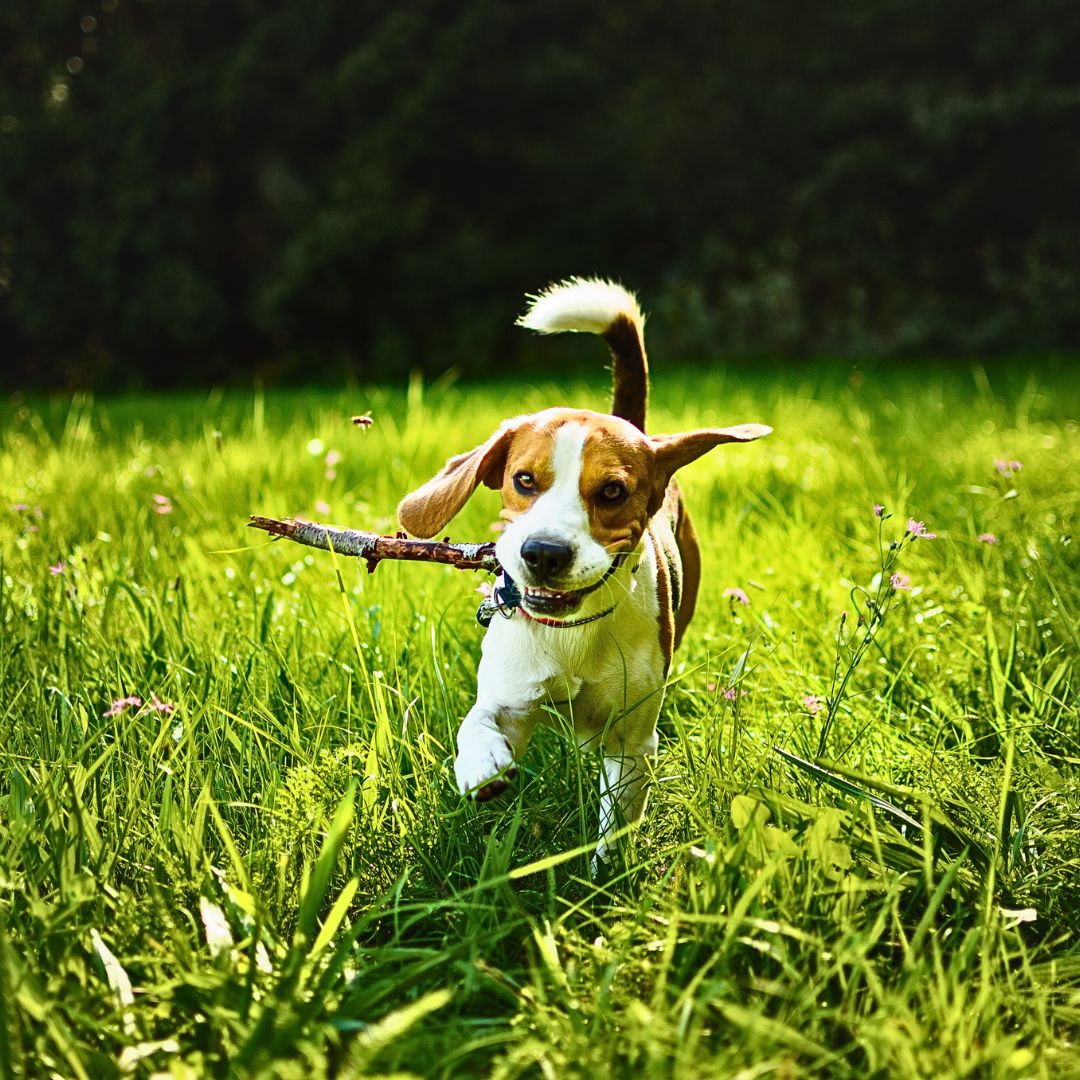
A dog is staring at a patch of grass with a red circle and line drawn through it while a hand offers a chew toy to the dog as a distraction. The background should show other dogs playing happily without eating grass.
Canine playtime stimulation keeps them from eating grass. Chew toys, puzzle toys, and interactive play are great replacements.
Here’s a quick summary of alternatives you can offer:
- Chew toys – Durable and designed to satisfy your dog’s chewing instincts.
- Puzzle toys – Keep their mind busy while providing a challenge.
- Interactive playtime – Engages them physically and mentally.
These strategies will help you manage and reduce your dog’s grass-eating habit. This will make your pet happier and healthier.
Natural Remedies for Dog Grass Eating
If your dog loves to eat grass, looking into natural remedies for dog grass eating is good. Making sure they get the right food is a big help. It can often stop them from chewing on grass.
Supplementing Fiber
Adding more fibre to your dog’s diet can stop the grass problem. Canine fibre supplements can improve digestion and make dogs less interested in eating grass. Foods like pumpkin, sweet potatoes, and oats are great for this.
Improving Diet Quality
Improving what your dog eats is also important. Choosing top-quality dog food with lots of essential nutrients helps. Brands like Blue Buffalo or Royal Canin are excellent choices. They help balance your dog’s diet and reduce their desire to eat grass.
Understanding Canine Dietary Habits
Dogs have always eaten in ways that echo their wild past. Even in our homes, they show habits that stem from their ancestors. Knowing this history helps us feed our dogs well.
Dogs in their natural habitat scavenging for food.
Evolutionary Instincts
Wild dogs mainly eat prey, including plant-filled stomach contents. This shows that they have a natural urge to eat plants, too. These habits carry over to domestic dogs today.
Domestic vs Wild Diets
Unlike wild dogs, today’s dogs get a steady diet that meets all their nutrient needs, including carefully made commercial food. Yet, they sometimes eat grass, hinting at their wild past.
| Aspect | Wild Canines | Domestic Dogs |
|---|---|---|
| Primary Diet | Prey animals, occasional plants | Commercial dog food |
| Grass Consumption | Ingested with prey | Behavioral, due to instinct |
| Nutritional Needs | Achieved through varied hunting | Balanced through formulated food |
| Feeding Patterns | Predatory and foraging | Scheduled meals |
Why Dogs Eat Grass as a Form of Self-Medication
Have you ever wondered why dogs graze on grass? A lot of it has to do with an instinct to deal with tummy troubles. Let’s dive into why they munch on those greens.
Upset Stomach Relief
Eating grass might help your dog’s upset stomach. This is part of their self-care process. It can soothe their digestive system. The grass is full of fibre. This helps food move smoothly through their belly.
Inducing Vomiting
One reason dogs graze on grass is to throw up. They might also eat grass if they’ve eaten something bad or can’t digest it. It can help get problem items out of their stomachs. But keep an eye on your dog’s eating of grass to avoid problems.
Is Your Dog Eating Grass Due to Boredom?
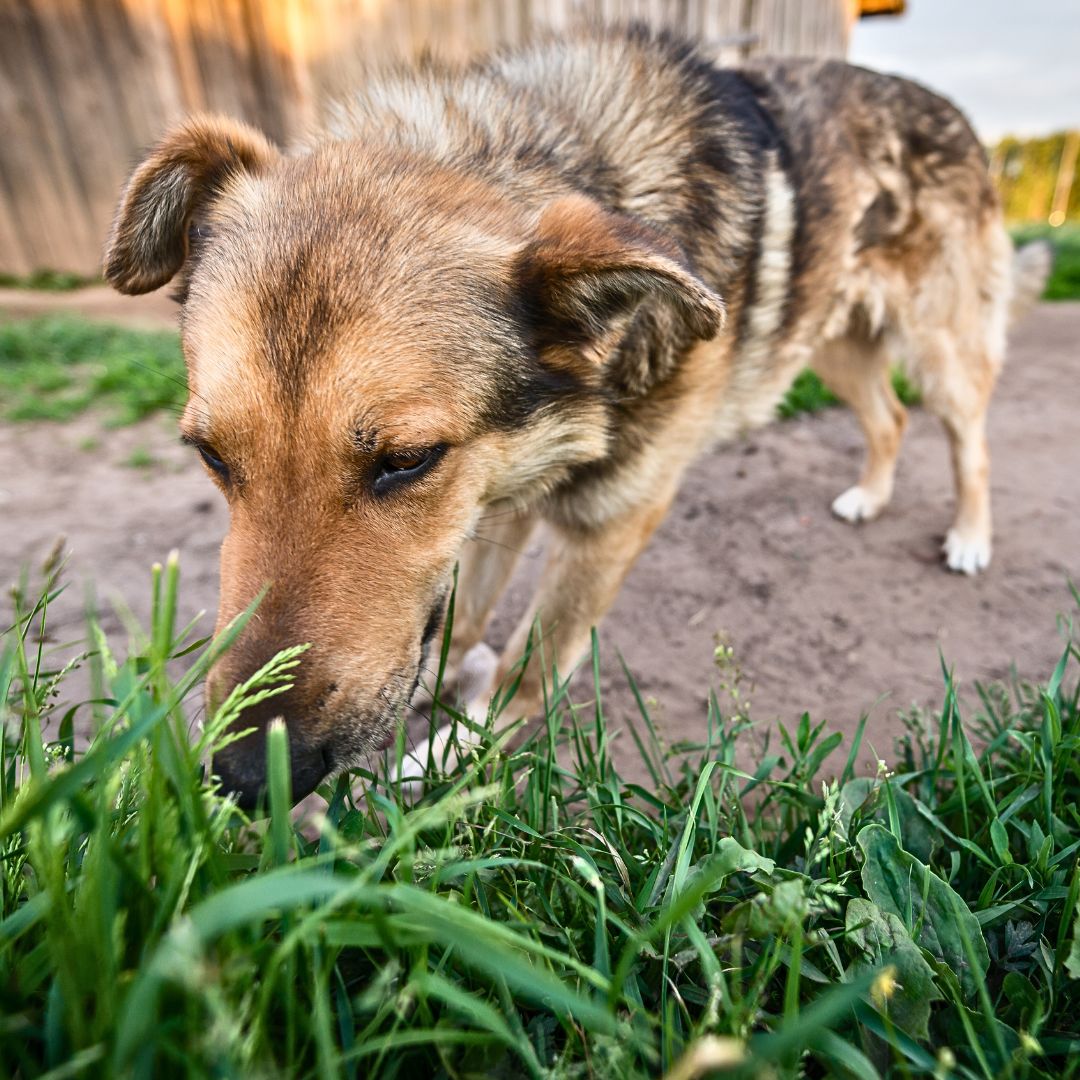
Dogs are smart and full of energy. Sometimes, they eat grass because they are bored. If your dog spends much time alone in the yard, they might eat grass to stay busy.
A curious dog sniffs and nibbles blades of grass in a backyard garden, looking intrigued. The sunlight highlights the grass’s vibrant green colour as the dog enjoys exploring its surroundings.
You can stop this behaviour by playing more with your dog. Please make sure they get plenty of exercise and playtime. An active and engaged dog will not eat grass to pass the time. Training and new toys help, too.
Here’s an easy way to see if your dog is bored or not:
| Stimulated Dog | Bored Dog |
|---|---|
| Engages with toys and activities | Resorts to dog grass nibbling |
| Has regular training sessions | Shows signs of canine boredom |
| Receives adequate exercise | Displays lack of stimulation in dogs |
Create a fun and active living space to keep your dog from eating grass out of boredom. This will make your dog healthier and happier, and they won’t eat grass.
Conclusion
Grass eating in dogs comes for many reasons. These include a need for certain foods, feelings, or instincts. It might indicate your dog is curious, missing something from their diet, bored, or trying to feel better. Figuring out the cause can help you deal with this behaviour better.
Eating grass itself is usually safe. But, as a dog owner, you should watch out for bad chemicals or bugs your dog might eat. To stop your dog from eating too much grass, ensure they get what they need in their diet. Also, keep them mentally and physically active.
You should consider treatment if your dog eats an unusual amount of grass. A vet visit is a smart move. They can suggest what to do and how to treat your dog’s situation. This approach can keep your dog healthy and happy, improving family life.
FAQ
Why does my dog eat grass?
Dogs eat grass for many reasons. This can include liking the taste, boredom, or missing something in their diet. It could also be for stomach relief or simply a natural habit. Every dog has its reason for doing this.
Is it healthy for your dogs to eat grass?
Yes, it’s normal for dogs to munch on grass. It’s often a part of their natural behaviour and curiosity; many dogs do this without health issues.
Can grass-eating be harmful to my dog?
Generally, eating grass isn’t harmful to dogs. Yet, they might ingest harmful things like pesticides from the grass. These substances can be dangerous for your dog.
Should I be concerned if my dog vomits after eating grass?
Vomiting after grass could be your dog’s way of feeling better by removing something bothersome from its stomach. If your dog throws up a lot or shows other signs of sickness, it’s best to see a vet.
How do I stop my dog from eating grass?
To stop this behaviour, use positive training and offer your dog other stimulating activities like playing more or giving chew toys. This can reduce their grass munching.
Are there natural remedies for my dog’s grass-eating habit?
Adding fiber-rich treats, like certain fruits and veggies, to your dog’s diet can help. A balanced diet with enough nutrients might reduce their urge to eat grass.
When should I see a vet about my dog’s grass eating?
See a vet if your dog’s grass eating is linked to diarrhea or frequent vomiting or if it seems less active. Your vet can check for health issues or offer diet advice.
Why does my dog eat grass when they are curious or bored?
Your dog might eat grass because it’s curious about new tastes and textures. It might eat grass out of boredom if it needs more mental or physical exercise.
Does my dog eat grass because of a diet deficiency?
One of the most common theories is that dogs eat grass due to a dietary deficiency, such as a lack of fibre or certain nutrients. However, research has shown that this is only sometimes the case. While some dogs may turn to grass-eating to supplement their diet, it’s not a universal explanation.
Other potential reasons for grass-eating include boredom, stress, or simply an instinct. Some dogs may find the texture or taste of grass appealing or seek to induce vomiting to relieve an upset stomach.
If other concerning symptoms accompany your dog’s grass-eating behaviour, it’s important to consult with your veterinarian. They can thoroughly examine the dog and recommend any necessary dietary changes or medical treatment.
Remember, the reasons behind your furry friend’s grass-eating habits may vary. Understanding the potential causes and working closely with your veterinarian can help ensure your furry friend’s Health and well-being.
Is my dog’s grass-eating related to evolutionary instincts?
Yes, dogs’ urge to eat grass can come from their wild family. Their ancestors used to eat the stomachs of herbivores, which were full of grass. Today, dogs sometimes eat grass like their wild cousins did.
Could my dog be eating grass to self-medicate?
Dogs might eat grass to make themselves vomit and feel better if sick. If this happens, watching them and checking with your vet is a good idea to avoid health issues.
Feel free to add this FAQ to your article. It provides helpful info on your readers’ questions about dog grass eating.
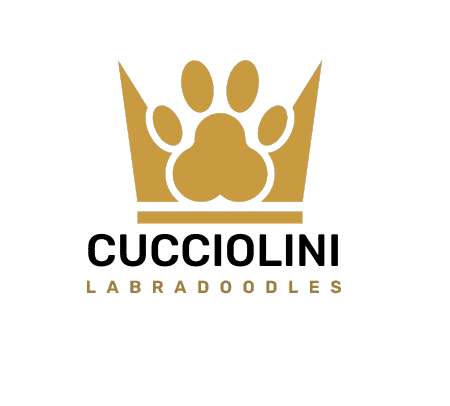
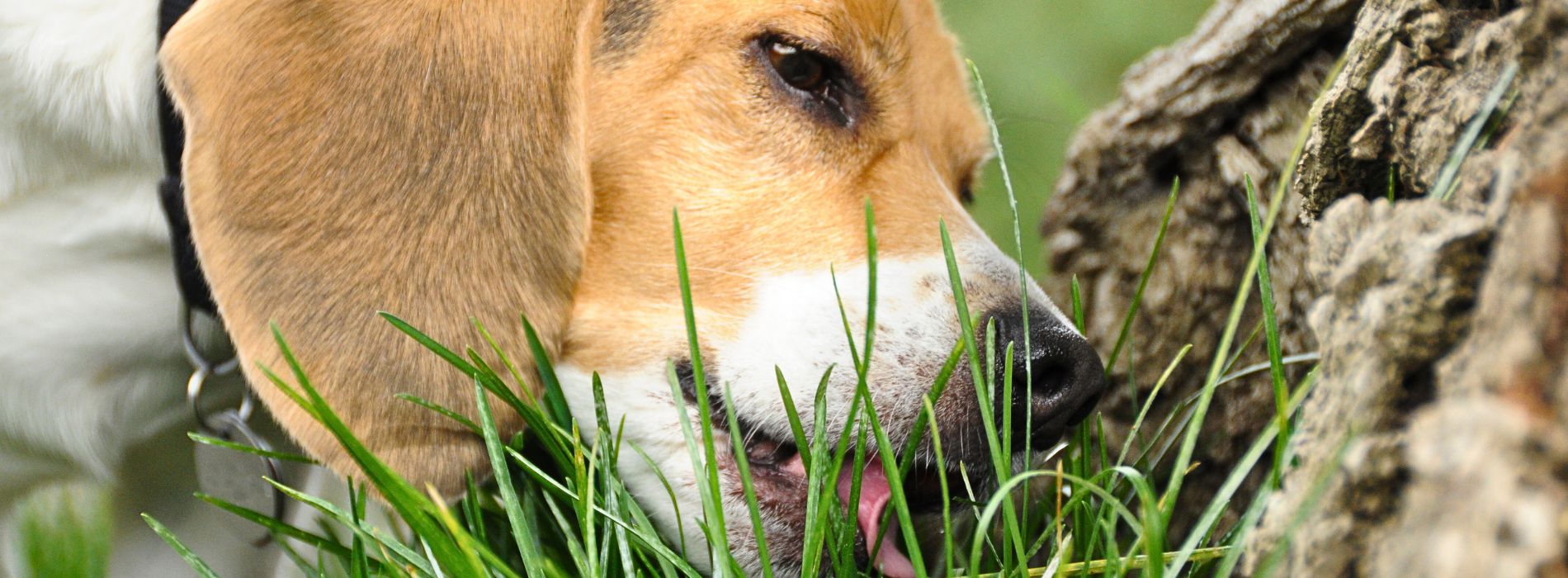

Leave a reply